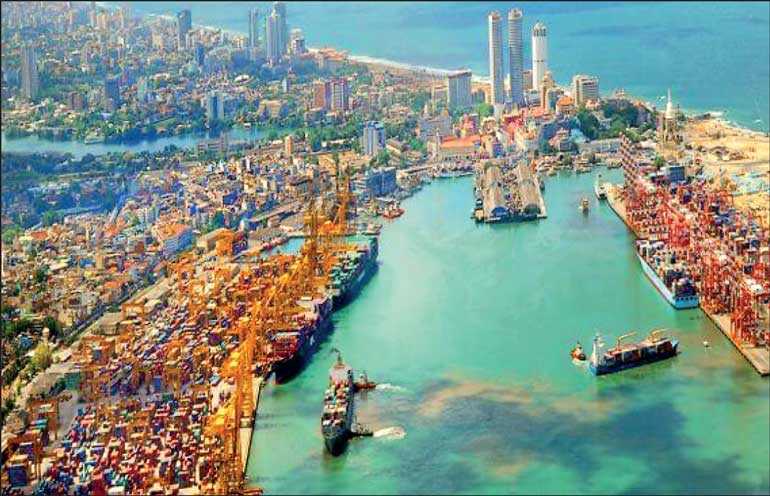Friday Feb 13, 2026
Friday Feb 13, 2026
Monday, 24 August 2020 00:08 - - {{hitsCtrl.values.hits}}

It takes a lifetime to build a reputation and a trivial oversight to ruin it. This was the fate of Port of Colombo, which was recognised as world’s fastest growing port in the first half of 2018 by Alphaliner. 
This recognition was timely complemented by Sri Lanka Ports Authority (SLPA) winning the awards for Port Authority of The Year and Port Infrastructure Development of the Year 2020 at the Global Port Forum Awards. On the contrary, despite all these wins it took only two days of worker unrest to lose approximately Rs. 2 billion of income and tarnish the hub status of Port of Colombo.
Sri Lankans are used to accepting strikes, protests and stoppage of work, and we often forget that the international community is not. And in a pandemic-blown industry where ports seem to be fighting for every TEU and competition is more fierce than ever, being customer centric, futuristic and value driven are no longer competitive advantages but bare necessities.
While we bank too much on our strategic location as a key differentiator in the region, this gem in our chest might soon be lost with the growth and emergence of regional ports, the latest being India’s planned transhipment port in Great Nicobar Island – a port with deep natural water depths that can accommodate mega ships and a viable alternative to Port of Colombo.
Yet not all hope is lost because it’s stormy seas that make waves.
The port strike was over in two days, and it will hopefully be the last of its kind. Yet, while there might be an unresolved debate about who should own and operate the most awaited East Container Terminal (ECT), the priority is that it’s operationalised commercially, as fast as possible.
The picture is big and many get lost in the details; looking at ECT in isolation doesn’t help – you have to look at the entire ecosystem of the Colombo Port and where it stands – a port with great potential running at 100% capacity losing business due to routine inefficiencies.
Meanwhile beyond our shores, the maritime industry is looking more futuristic than ever –traditional ports are being redesigned by technological advancements; New industry drivers are disrupting ports every day such as the increasing focus on spatial strategies where countries are looking at creating port-city synergies; Asian ports are gaining importance; European ports are strengthening their digital supply chains, and locational advantages are being shadowed by sustainable operations. Yet for Sri Lanka, we find ourselves fighting fires to stay afloat.
Whether we own it fully or not, with the operationalisation of the ECT, Colombo Port must gather its troops, collaborate and cooperate with all its stakeholders to first reinstate our hub status and then embrace ourselves to be the most preferred port in the region. A tall order and one that requires investing in public-private-partnerships, revisiting policies and procedures, reimagining customer service and maintaining a forward-thinking attitude.
Efficiency through collaboration
Ports and carriers alike are driven by regulations, pressurised by profit margins and pushed by time constraints where every minute lost amounts to dollars wasted and customer credibility ruined. Increasing collaboration is key as it results primarily in a more transparent ecosystem, avoiding bottlenecks, miscommunications and time lags. Vertical collaboration through supply chain integration and horizontal collaboration between terminal operators are not just necessary but value adding for all parties concerned, because at the end of the day despite inter-terminal competition, everyone wants the same thing – more vessels calling at Colombo Port.
Replacing old with new
The Colombo Port has been in operation for over 2,000 years counting for unparalleled experience in the region and even the world. Yet differentiator turns destroyer as long as we are governed by archaic practices, which would have made perfect sense decades ago but cause unwanted inefficacies today. From acts and policies to ordinances and bills, port-related legislation urgently needs a do over and enabling this is vital for Colombo Port to remain relevant, today.
Embracing technology
Ports are embracing innovations from IoT to robotics: terminals from the Hamburg-Le Havre range to major Middle East hubs and Chinese mega-terminals investing in terminal automations, 5G mobile data technology being tested out at the port of Antwerp, smart port platforms emerging in Rotterdam and the Port of Vancouver utilising unique track and trace technology, are just a few examples of innovators and early adopters. While these albeit being definitely possible advancements might seem slightly far-fetched expectations in terms of the Colombo Port as of now, we too must get on and drive the technology bandwagon. The forced digitalisation experienced during the pandemic was a golden opportunity to start our digital journey and keep going forward, one digital step at a time. From simple sharing of data between parties across a digital platform, to investing in complementing infrastructure, gradual automation of processes, data-driven decision making and the adoption of a collaborative attitude among all parties concerned, it is an all-hands-on-deck operation to transform the Colombo Port into a technology-enabled regional hub.
Green seas
Quickly becoming a key determinant of success, there is no denying that sustainability is gaining importance as the most prioritised value proposition. Already embraced by European ports such as the ports of Antwerp and Amsterdam, and to a lesser degree by American ports, sustainable and environmentally friendly port operations leading the way to green port eco-systems is an area that the Colombo Port must keep two eyes on, before it will be too late to be surprised.
Discipline first
Growth is powered by development while success is fuelled by discipline. Being collaborative, relevant, technology-driven, consumer centric, sustainable and above all, competitive, all boils down to maintaining professionalism, efficiency and discipline. It is difficult to think of innovations when fundamentals and necessities are challenged in the form of strikes, protests and other disruptions. There might be different questions, different solutions and different reasons, but there should only be one unified agenda – to make Colombo Port the most preferred regional port, and that requires a lot of work by everyone involved.
The writer is Vice President, Evergreen Shipping Agency Lanka Ltd.